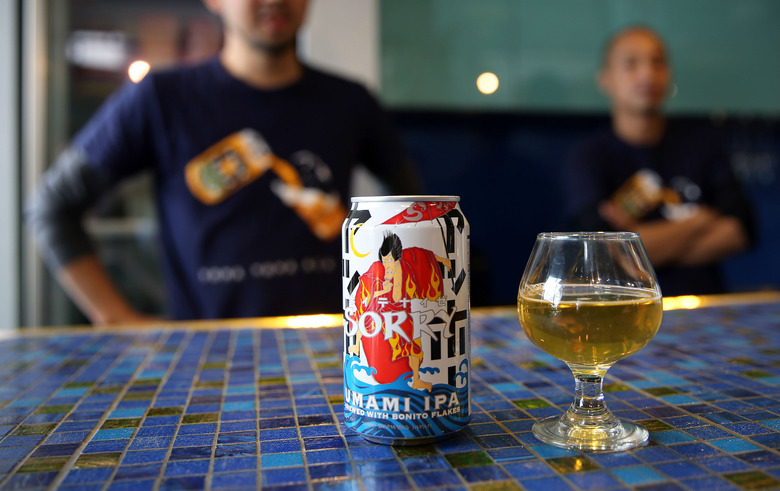5 Uniquely Japanese Beers You Can Actually Buy In The U.S.
The unmatched camaraderie of America's beer industry is both its greatest strength and its greatest weakness: On one hand, shared ideas promote innovation and growth; on the other, trends that spread like wildfire can tire out even the most devoted brew-hounds. For all of the industry's creativity, Americans are often inundated by beer styles in waves — be it with fruity sour ales, hazy IPAs, or decadent pastry stouts.
So it's no wonder that seasoned drinkers have begun seeking out more exotic flavors found only in far off places. Sure, beer of any category can be made all over the globe by importing hops or malt, but as with wine, terroir — the expression of an origin's specific climate, soils, and terrain in liquid form — is becoming a greater influence on the beverage than ever before.
Nowhere is this felt more than in Japan, where unique ingredients — whether indigenous malt, hops, or adjuncts such as fruit or spices — define many of the country's best beers. And thanks to America's unquenchable thirst, more and more of these beers are being exported to the United States.
I've traveled from northern Iwate all the way down to Ishikawa in search of beers made with special ingredients native to the Pacific island nation, and rounded up the best of those that can also be found in the United States. Seek out the following five delicious, intriguing brews to enjoy a taste of Nippon from the other side of the world.
Iwate Kura Japanese Herb Ale
Key Ingredient: Sansho Peppercorn
Region: Iwate
A 100-year-old sake producer, Sekino Ichi began brewing beer relatively recently: only 22 years ago. Yet this is long enough that their Iwate Kura craft beer brand is one of the oldest in Japan, and a leader in the movement to brew with native ingredients in an otherwise bland sea of Japanese macro-lagers or imitative American styles. The brewery uses local yuzu, cherry blossom, persimmons, orange peel, raspberries, and even oysters — but their most distinctive product is their Herb Ale, brewed with sansho, the spicy Japanese peppercorn belonging to the Rutaceae citrus family. The well-made beer is incredibly flavorful, with a distinctly spicy, lime-like aroma, but clean and refreshing as all get-out.
Hitachino Nest Nipponia Ale
Key Ingredient: Kaneko Golden Malt and Sorachi Ace hops
Region: Ibaraki
Like Sekino Ichie, Kiuchi Shuzô got its start in sake long ago (in 1823!). Yet Kiuchi's Hitachino Nest brand is now the best known Japanese craft brewery in the U.S. thanks to the success of their flagship Belgian-style White Ale — first produced in 1996, and embraced soon after by importers and restaurateurs such as Momofuko Group's David Chang. White Ale has its charms, but Hitachino's Nipponia Ale, brewed with Kaneko Golden, Japan's first ever beer malt, is truly exceptional. As a hybrid of ancient Japanese noodle barley and American barley, the robust, golden grain imparts increased levels of protein, nitrogen, and richness to Nipponia Ale. Meanwhile, indigenous Sorachi Ace hops beautifully complement the malt with lemon and herbal cilantro notes. (Likewise, their red wine barrel-aged version is incredible, if you can find it!)
Yo-Ho Sorry Umami IPA
Key Ingredient: Bonito Flakes
Region: Nagano
Founded in Nagano in 1996, Yo-Ho has since become the largest craft brewery in the country (it helps that mega-brewer Kirin purchased a 33 percent stake in the brewery in 2014). The brand built a reputation in Japan with its American-style flagship Yona Yona Ale, but is now making waves overseas with creative brews like their Sorry Umami IPA. Produced solely for the U.S. market, the beer is brewed with bonito flakes (or katsuobushi) that not only help facilitate fermentation, but contribute to its flavor profile. For those terrified of a "fish flake beer," have no fear: The bonito only adds a subtle sea-like salinity without ever making it fishy.
Waku Waku Light Ale
Key Ingredient: Locally Grown Rice
Region: Ishikawa
Located on a remote farm in rural western Japan, Waku Waku Tezukuri Farm Kawakita is one of the smaller breweries on this list, and has only begun exporting to the U.S. in the last two years. Unlike Japanese brewers who purchase matcha, yuzu, or black beans from other parts of Japan, Waku Waku uses ingredients harvested from their own farm. They have even begun to grow a mix of American and British hops (Challenger, Centennial, Fuggle, Nugget, and Cascade, to be exact), but their greatest asset is rice, the crop which has prevailed throughout the region for centuries. They use this rice to brew their Light Ale, a smooth, crisp, clean and bone-dry beer that American lager guzzlers will adore.
Coedo Beniaka Amber Ale
Key Ingredient: Roasted Kintoki Sweet Potatoes
Region: Saitama
One of the oldest craft breweries in Japan, Coedo was founded in 1996 by the pioneers of farm-to-table produce distribution in Tokyo. Kyodo Shoji Koedo processed secondary vegetables into new products — including beer. One of their initial recipes was the first commercial sweet potato beer in the world, Beniaka, an amber ale brewed with local, roasted Kintoki sweet potatoes from Saitama. The unlikely ingredient allows for a balanced sweetness that amplifies caramel malts and an earthy, savory touch that melds nicely with mellow, herbal hops. It's a true taste of Japanese terroir that we can now enjoy from across the Pacific Ocean, even if you can't travel the globe to try the world's 50 best beers.
More From The Daily Meal:
15 Reasons to Drink a Beer Every Day
How Much a Six-Pack of Beer Cost the Year You Were Born
The 25 Best Cities for Beer Lovers
Ethan Fixell is a freelance beverage writer from New York City. A Certified Cicerone®, Certified Specialist of Wine, and Certified Specialist of Spirits, he teaches wine and spirits classes at Astor Center in New York, and is the U.S. Executive Director of rock and metal publication Kerrang!.
